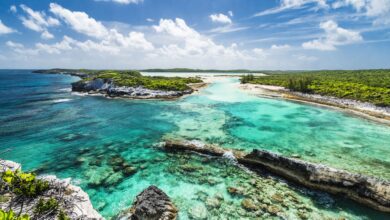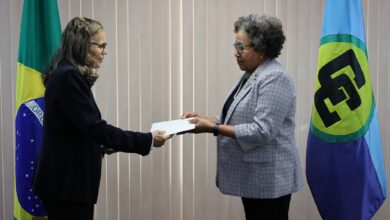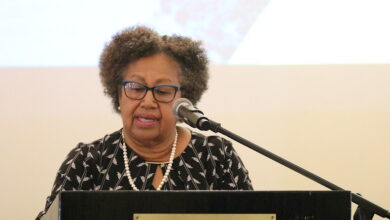(CARICOM Secretariat, Turkeyen, Greater Georgetown, Guyana) The Seventeenth Special Meeting of the Council for Human and Social Development (COHSOD) on Sport was convened under the theme: Promoting Inclusion, Health, Education and Development through Sport, at the CARICOM Secretariat, Greater Georgetown, Guyana on 9-10 October 2012. The meeting was chaired by Senator the Hon. Winston Williams, Minister of State with Responsibility for Sports, National School Meals Service and Special Projects in the Ministry of Education, Youth, Sports and Gender Affairs, Antigua and Barbuda.
In attendance were: Hon. Stephen Lashley, Minister of Sports in the Ministry of Family, Culture, Sports and Youth (Ecclessiastical Affairs), Barbados; Hon. Herman Longsworth, Minister of Sport, Ministry of Education, Youth and Sports, Belize; Hon. Justina Charles, Minister of Culture, Youth and Sport, Dominica; Hon. Patrick Simmons, Minister of Youth Empowerment and Sports, Grenada; Hon. Frank Anthony, Minister of Culture, Youth and Sport, Guyana; Hon. Ismanto Adna, Minister of Sport and Youth Affairs, Suriname and Hon. Edison A. Baird, Minister of Health and Social Development, Anguilla.
Also in attendance were: Directors of Sport and Permanent Secretaries, representatives of regional sporting organizations, the University of the West Indies and the Commonwealth Secretariat.
OPENING CEREMONY
The opening ceremony was addressed by Honourable Dr Frank Anthony, Minister of Culture Youth and Sport, Guyana; Ambassador Lolita Applewhaite, Deputy Secretary-General, CARICOM Secretariat; Mr Keith Joseph, Executive Member, Caribbean Association of National Olympic Committees (CANOC) and Ms Myrna Bernard, Officer in Charge of Human and Social Development Directorate in the CARICOM Secretariat.
Dr Anthony stressed the importance of greater synergies between regional governments and regional sporting bodies as well as increased collaboration and participation in physical education and sport and called for greater commitment and investment in regional sports. He recommended that the Caribbean Community take “bold steps” in implementing “a strong school-based physical education program across the region” to avoid further increase in the rate of child obesity.
Ambassador Applewhaite noted that Sport must be developed and treated as part of the tradable sector and be re-positioned to contribute to the sustainable livelihood of people in the Region. According to her, the business of sport must be pursued vigorously, and this must be done with serious dialogue among stakeholders.
She stated further that it was critical to ensure that the Region’s people adopt active and healthy lifestyles across every stage of their life cycle. She pointed to reports that indicated the increasing incidence of obesity and chronic lifestyle diseases among youth, and the increase in life expectancy across the Caribbean; and further emphasized the need for greater attention to be paid to the management of seniors and persons with disabilities. “Provisions,” she added, “must be made for them to become and remain healthy and functioning members of society.”
Mr Keith Joseph called for renewed commitment to physical activity particularly among school children, senior citizens and persons with disabilities. He pointed to the pivotal role of physical activity in social, economic, intellectual and cultural development and established the link between physical activity and Caribbean values; but also noted that the practice very often belied the theory. He called upon regional leaders to change their mindset and perspectives about development, asserting that development “is about people; it is about improving the social condition of every individual in our society.”
Ms Bernard said that it was not only necessary to engage all key stakeholders in promoting physical education but it was also an imperative to provide appropriate levels of training for teacher educators and teachers in order to reorient the perspectives of school administrators, teachers, parents and communities on physical education.
OVERVIEW OF PHYSICAL EDUCATION AND SPORTS IN THE REGION
Implementation of Physical Education and Sport Programmes in CARICOM Member States: Barriers and Challenges
After deliberating on the presentation which highlighted the benefits of physical education and sport to all – from the formative years to the elderly – COHSOD examined the challenges involved in providing quality physical activities in school and noted that there was ostensibly a lack of appreciation, on the part of school administrators and policymakers, for the physical and educational benefits of physical education. The Meeting also noted the link between PE and health and agreed that it was necessary to embrace Physical Education and Sport to help combat Chronic Non-Communicable Diseases.
COHSOD therefore agreed to commission a study on the status of PE and Sport in schools across the region.
COHSOD also mandated the CARICOM Secretariat to take immediate steps to finalize and disseminate the CARICOM Curriculum Framework for Physical Education in all Member States and further requested the Secretariat to develop very quickly, the Adapted Curriculum for Persons with Disabilities to inform the development of National PE Curricula by Member States. They urged Member States to develop or update their national curricula and ensure that they were in sync with the CARICOM Curriculum Framework. COHSOD also stressed the need for the teaching of quality PE and sport at all levels to be aligned with the CARICOM Curriculum Framework, and highlighted the need for more programmes and training facilities to nurture talented sportspersons. COHSOD further requested that the CARICOM Secretariat work with Member States to develop a regional strategic framework for adaptive sport and physical activity and to adapt the Regional Curriculum Framework for Physical Education up to Grade 12.
COHSOD requested Member States to put the necessary systems in place to ensure that all PE teachers and coaches received adequate and relevant training as well as appropriate remuneration and were given the opportunities to specialize in various areas of PE and Sport. In addition, the COHSOD proposed that the philosophy, values and purpose of PE and Sport should be reflected and incorporated in the overall curriculum of teacher training colleges.
Strengthening PE and Sport in Schools
COHSOD received a presentation which highlighted the important role of sports clubs in the progressive development of Sports and the individual. It was agreed that greater dialogue between stakeholders in government, sports clubs NGOs and the private sector should be encouraged to facilitate the development of clubs as effective, community-oriented functioning organisations. In this regard, COHSOD urged Member States to engage and collaborate with key stakeholders to promote continued improvement of sports in schools and communities.
Child Protection and Safeguarding
COHSOD discussed the new concept of “safeguarding,” acknowledging that it was a broader concept than child protection since it included prevention. They perceived that sport could be used as a vehicle for promoting discipline and values that could cause abuse of children, especially when coaches and PE teachers put pressure on them to excel. The Meeting urged Member States to adopt comprehensive policies that ensure the protection of all children involved in PE and Sport and to include the concept of ‘safeguarding and protection’ in their communication and advocacy strategies.
The Meeting also noted the availability of funds for workshops through the Australian Sport Outreach Programme and encouraged Member States to nominate persons to participate in a regional workshop on child protection and child safeguarding which would be facilitated by the Trinidad and Tobago Alliance for Sports and Physical Education (TTASPE) in November.
FOSTERING INCLUSION THROUGH SPORT AND PHYSICAL EDUCATION
Inclusive Sport and Physical Education: A Harmonised Approach
The Meeting discussed the need for greater attention to be paid to inclusive sports. They referred to the Kingston Accord (2004), the United Nations Convention on Persons with Disabilities and other decisions of CARICOM Heads of Government to underscore the point that the differently-abled must be included in physical activity and sports. The Meeting agreed to promote strong policy and programme guidelines such as those included in the 2008 UN Working Group Report on “Harnessing the Power of Sport for Development and Peace: Recommendations to Governments.” Against this background, they encouraged Member States to identify those guidelines which could be implemented in the short to medium term. COHSOD also encouraged Member States to share their experiences on programs, policy initiatives and systems that ensured that persons with disabilities were allowed full participation in physical activity and sports. The Meeting further agreed that the Regional Task Force on PE should be reactivated.
The COHSOD also noted that the Regional Sports Academy, which was recently established in Suriname, would assist Member States in building their capacities to facilitate full participation of the differently-abled in sports and PE.
Strengthening the National Para-Sport Organisations for Sustainable Implementation
Following deliberations on the need to work with Para-Sport Organisations in reducing stigma and using sport as a socializing agent for the disabled, COHSOD encouraged Member States to put systems in place to strengthen and support the work of Para-Sport Organizations and for Member States, which had not yet done so, to establish Para-Sport Organizations.
Special Interest Sports
COHSOD commended the Trinidad and Tobago Alliance for Sports and Physical Education (TTASPE) for its work in developing adaptive sport programmes such as the Regional Ready and Able Project for persons with disabilities at both the community and school levels.
Community Sports and Physical Activities for Senior Citizens – The Cuban Model
It was noted that the elderly population had increased significantly in the region with a longer life expectancy. Against this background the COHSOD recognized the need to promote healthy lifestyles among its elderly by providing an enabling environment for them to participate in physical and recreational activities. The Cuban Model was reviewed as one example of good practice that could be benchmarked by Member States. This model includes programmes that focus on the involvement of seniors in daily sport and physical activities, delivered by trained specialists. COHSOD then encouraged Member States to consider policy and legislative refinements necessary to facilitate the health, social and economic well-being of senior citizens. The Meeting supported the development of national and regional plans for the implementation of physical education and sport programmes for senior citizens and called for the collection of empirical data on the status of senior citizens in the Region.
GOVERNANCE AND MANAGEMENT
Promoting Regional Cooperation on Sports: Establishment of a Regional Database on Best Practices in Sport for Development.
COHSOD discussed Sport for Development in the region and noted that Sport for Development approaches had been incorporated into development policies and agendas of several Member States. It was noted that several successful programmes were in train in Member States. In this context therefore, the COHSOD agreed to a proposal to establish a data base on Sport for Development best practices in Member States to facilitate collaborative learning. The COHSOD further encouraged Member States to cooperate and provide information for the data base.
REALIZATION OF OPPORTUNITIES FOR MAXIMISING THE POTENTIAL OF SPORT AS A BUSINESS
Promotion of Caribbean Sports Tourism – one Brand, Many Products
The meeting received two presentations which highlighted the Caribbean’s potential for Sport Tourism. The presentations identified international linkages and prime destinations and products that could be harnessed and marketed creatively and competitively to attract tourists from targeted Eastern regions such as China and India. It was noted that sports tourism accounted for 14 per cent of the overall tourism and travel industry and that growth was guaranteed for the next ten years.
Regional collaboration to maximize sports tourism development
COHSOD agreed to establish a Technical Working Group to identify areas for regional and international cooperation in Sports and to devise creative strategies in harnessing resources – human, financial and material – for the development of sports tourism. COHSOD recognized that there were many options for the region besides bidding for mega sporting events, such as hosting general meetings of International Sporting Organizations or bidding to host smaller international games and events. The CARICOM Secretariat was requested to develop terms of reference and make recommendations for the composition of the working group.
Development of a Regional Sport Tourism Strategic Framework
The COHSOD reviewed and discussed the key modalities critical to the establishment of a regional strategic framework for sport tourism and agreed that in developing such a framework, the Region needed to draw on best practices in competitive sports business markets. Several of the key modalities discussed included the building of regional consensus and political will for a unified approach to sports tourism; establishing a regional task force on sports tourism; developing a concept paper on sports tourism and developing a cadre of dedicated personnel within the relevant Government Ministries to communicate and manage sports tourism initiative
UPDATES
The Commonwealth Youth Games
Saint Lucia has been awarded the franchise to host the Commonwealth Youth Games 2017. The COHSOD received an update on the background and development of the Games over the years as well as the preparations that were being made by this Member State. Approximately 1000 athletes from 71 nations are expected to attend and participate in six to 8 sport disciplines. Saint Lucia is working with a budget of US$12 million to host the Games, which would be dedicated to one of the Caribbean’s greatest Sports Administrators, Mike Fennell. COHSOD congratulated Saint Lucia on winning the bid to host the Games, and committed to providing any support necessary to St. Lucia.
Regional Sports Academy
COHSOD commended the achievements of the Regional Sport Academy, which was on schedule to graduate its first batch of certificate students in November. The Meeting also applauded the collaboration between the Academy and TTASPE which had spawned several scholarships for students at the academy.
The Role of the University of the West Indies in the Development of Sport in the Region
COHSOD received a presentation which reiterated the value of sports to individual and community health. The presentation advocated for the protection of athletes through the establishment of minimum safety standards in relation to sports safety screening, pre-participation testing and the use of qualified sports medicine personnel to accompany elite athletes and teams to competitions and events. It was proposed further that the establishment and monitoring of these standards could be done through the setting up national and regional committees. COHSOD applauded the work of the University especially in the area of providing educational programmes and support to the Region’s athletes and for the development of High Performance Centres.
Proposal to establish the OECS Bio-Mechanics Centre
COHSOD also discussed a proposal for the establishment of a state of the art Bio Mechanics Centre in the OECS. The presenter emphasized the value of such technology in identifying mechanical flaws in the motions of athletes and prescribing corrective interventions to prevent injuries.
The COHSOD recognized the usefulness and importance of a Bio mechanics centre in the development of the Region’s elite athletes.
APPRECIATION
COHSOD recorded their gratitude for the support and participation of the regional and international partners and the work of the Secretary-General and staff of the CARICOM Secretariat in making arrangements and efforts to ensure the success of the Meeting. They also expressed appreciation to the Government of Guyana for the warm reception given to delegates.






